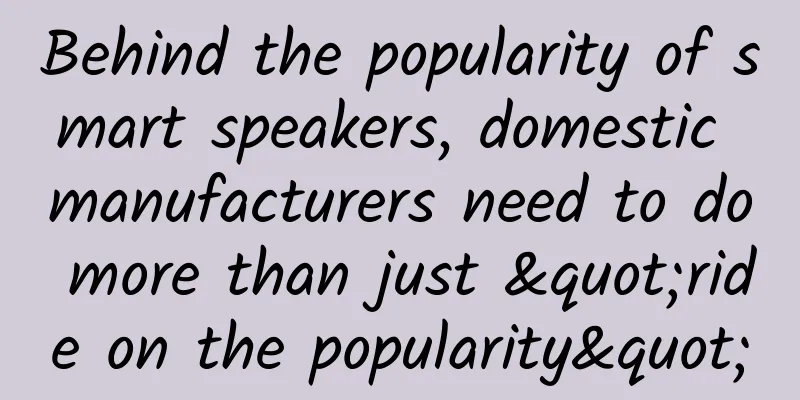Behind the popularity of smart speakers, domestic manufacturers need to do more than just "ride on the popularity"

|
The hot battle of smart speakers has spread from abroad to China. On July 5, Alibaba Group will release its latest artificial intelligence speaker product in Beijing, officially announcing its entry into this field. Previously, Tencent Vice President Martin Lau also publicly stated that Tencent's smart speaker product "Ear" will be released around August. Together with JD.com's "Ding Dong" which has already entered the market, smart speakers, which seem to be not new, have once again set off a new round of competition in the smart home field. The war has spread from international to domestic . When it comes to smart speakers, we have to talk about Amazon. From its official release in November 2014 to now, more than two years later, Amazon Echo smart speakers have gone from being unknown at the beginning to becoming one of the hottest smart home products on the market. People can use Echo to control home appliances, purchase goods, and inquire about consultations with voice. According to survey data from research institution eMarketer, in the United States, about 36 million users use voice-controlled speakers once a month, and this number is still expanding. In more than two years since the release of Amazon Echo, sales have exceeded US$1 billion. The huge market attracts major giants to enter. At the Google I/O conference held on May 17 last year, Google released Google Home, which directly competes with Amazon Echo. On May 9 this year, just one day after Amazon released the touch-screen Echo Show, Microsoft released the Invoke smart speaker jointly developed with Harman Kardon at the Build conference, which has built-in Cortana, an artificial intelligence assistant that Microsoft has been developing for many years. Immediately afterwards, Google updated Google Home and Google Assistant at Google I/O on May 17. After upgrading the new version of Google Home through deep learning and other technologies, it now only needs two microphones (Amazon Echo needs a seven-microphone array) to accurately locate the people speaking around; in addition, Google Assistant announced that it covers more than 100 million devices. On June 5, Apple also announced the launch of the home smart speaker HomePod, priced at $349. Although Apple Senior Vice President Phil emphasized the "music cells" of HomePod in his speech, he also pointed out its intelligent voice interaction (Siri) function and the central control role it may play in the HomeKit smart home service. So far, the competition among international giants around smart speakers (actually voice interaction devices) has been fully launched. In comparison with China, the actions are much smaller. Although Internet companies such as JD.com, Baidu, Tencent, Xiaomi, and Cheetah are all deploying smart speakers or similar voice interactions, both products and strategies are still in a very "primary" stage. Let's first look at JD.com, which has the earliest layout and the largest product sales. In 2015, JD.com and iFlytek jointly established Linglong Technology and launched the "Dingdong" smart speaker at the annual meeting. At CES not long ago, Linglong Technology launched two new products of Dingdong smart speakers: Dingdong TOP and Dingdong 2nd generation smart speakers. According to public reports, compared with previous products, Dingdong Top has cut off a large number of pronunciation units to minimize the volume. The reason is that Linglong Technology hopes that it will be seen as a home assistant rather than a speaker. Currently, users can use it to remotely control smart TVs, query information from the embedded assistant, and obtain services. Lenovo has also released its own smart speaker. At the Lenovo Innovation Technology Conference in May this year, Lenovo announced that it would invest 10 billion in the smart home field to create products that ordinary people can afford, and demonstrated a "chatting" smart speaker on site, trying to be a local version of Echo in terms of appearance and function. More companies are still in the layout and research and development stage. In February this year, Baidu acquired "Raven Technology", which develops smart home central control, and was directly responsible for the newly appointed Baidu President Lu Qi; in April, Tencent announced the launch of the AI voice assistant "Tencent Dingdang", which directly targets Amazon's Alexa; also this month, Mobvoi announced its withdrawal from virtual personal assistants and the Tichome smart speaker that will be launched in the second half of the year; just recently, the first product of the Orion Star AI ecological chain under Cheetah, the Xiaoya AI speaker released in cooperation with Himalaya, was also announced to be launched. According to the author's understanding, the launch time of this speaker is a few months later than the expected release time. In other words, although almost all players hope to become a "local version of Echo", there is still no mature product in China that can compete with Amazon Echo. Market research firm StrategyAnalytics pointed out that in 2016, the global shipment of smart speakers reached 5.9 million units, and will increase 10 times in 2022, with a market value of 5.5 billion US dollars. Gartner predicts that by 2018, 30% of human-computer interactions will be completed through natural language. Perhaps next year will be the decisive year for the explosive development of smart speakers. What cards do the three giants have in their hands ? If you review the development of Amazon Echo from its launch to the present, you will find that technology, scene applications and user data are the main barriers to its development. First of all, at the beginning of Echo's release, Amazon did not overemphasize the concept of the so-called "smart speaker", but only regarded it as a product of speaker upgrades. Amazon executives including Bezos only had very cautious expectations for this speaker with far-field voice recognition function: they just hoped that the new experience provided by Echo would make users more willing to shop on Amazon's e-commerce website. After seeing that the market performance was not bad, Amazon raised Echo to the level of the company's strategic business and announced that Alexa would be open. In this process, even many third-party accesses were completed by Amazon itself, and Echo also entered the mass market from the niche circle of early users. This was not only due to Alexa's voice recognition technology advantages, but also the open platform allowed more third-party applications to bring rich applications and value to users. In this process, the continuous accumulation of user data made Echo more and more useful. However, the battle behind smart speakers is actually a battle for AI. Data and call frequency play a very important role in the "evolution" of an AI product. From this perspective, the Echo model has limitations. Although Echo products have sold tens of millions of units and Amazon Alexa itself is becoming an open platform, it is only based on Amazon's own ecology. At the Google I/O conference not long ago, Google Assistant announced that it has covered more than 100 million devices, and this number will increase significantly as it connects to more hardware platforms. What is more noteworthy is that Google has begun to deeply apply its latest AI technology to Google Home. At the same time, Google Assistant, which integrates voice and image processing capabilities, is also constantly evolving and "feeding" data. In addition to data from Google user platforms, these data also come from various mobile phones, air conditioners, refrigerators and other equipment terminals connected to Google Assistant. Behind the popularity of smart speakers, domestic manufacturers need to do more than just "ride on the popularity". The latecomer Apple focuses on "sound quality". Apple first emphasizes that HomePod is a speaker with superior sound quality that can satisfy your music pleasure, which is actually an intelligent voice assistant. In terms of pricing, Apple is also different from other products. This actually reminds domestic players who are collectively "copying" smart speakers: smart speakers should not only be smart, but their basic "speaker" function - sound quality is also crucial. Where is the gap between domestic adventurers? Echo and its voice assistant Alexa have made Amazon soar. The view that smart speakers carry the interactive entrance of smart homes has been continuously recognized, especially in this field, where the four giants Amazon, Apple, Google and Microsoft have gathered, which is equivalent to unanimously identifying the correct direction of the road. Under such circumstances, how can domestic companies, big and small, not flock to it, hoping to become the "Chinese version of Echo and Home Pod" and occupy a place in the best entry point of the next technological trend - artificial intelligence. However, judging from the few smart speaker products currently on the market, there are still many areas that need to be improved, such as the sound quality of the speakers is too average, and the voice assistant is very difficult to use. However, in the Chinese market that international giants such as Amazon and Apple have not taken into account, it does leave a lot of room for domestic players. To be honest, it is not necessarily the speakers, but the ecological chain behind the small speakers that can attract giants to gather in this field. After all, voice assistants are one of the most frequent applications in the field of smart homes. Intelligent voice can be combined with various household appliances such as TVs, stereos, air conditioners, curtains, lamps, toys, and smart home control central systems, and realize one entrance to control all functions through voice interaction. This is also one of the most convenient ways of interaction in the era of artificial intelligence. At the same time, the promotion of big data and artificial intelligence technology, the reduction of key technologies and component costs, and the establishment of industry alliance standardization protocols have brought about the rapid growth of the smart home market. In the future, it may not be the form of smart speakers, but may also be mobile phone voice assistants, smart TVs, smart air conditioners, or other devices. The ultimate essence is still on users, data, and services. Compared with the big data support behind smart speakers owned by Apple, Amazon, Google, and even Microsoft, domestic companies involved in the field of smart speakers basically do not have a high voice in this field. To describe the differentiation of smart speaker products at home and abroad in a simple and easy-to-understand phrase from industry insiders is: "Foreign giants are rushing to land on smart speaker products because they regard it as the best entry point for many services and obtaining user data, while domestic companies sell speakers just to sell speakers, and there is no real service. Most of them are selling them as new digital devices other than mobile phones." Although such comments may not be comprehensive, it is an indisputable fact that domestic companies do not yet have the support of cloud computing + big data services. Even domestic giants like Baidu, which are making full efforts to deploy artificial intelligence, may not be able to have basic operating conditions in the ecological chain. Alibaba, Tencent, JD.com, etc. are rushing to this field, more like looking for a means to provide value-added and incremental services for their core business lines. It is reported that in the smart speaker that Alibaba is about to release, users can make voice purchases on Taobao and Tmall by issuing corresponding commands. Its built-in voice assistant will demonstrate the natural language processing results of Alibaba's technical team for the first time. It is claimed in public information that the model answer rate established by the smart speaker in text classification and intelligent question and answer is currently the highest level in the industry, even slightly higher than Microsoft and IBM, but whether it can achieve accurate recognition in the Chinese language is a little bit exciting. Tencent Executive Director Martin Lau also publicly stated that Tencent is developing a smart speaker "ear", which may be released around August, but it is not yet known whether Tencent Cloud and voice recognition technology can provide transcendent technical support for this smart speaker. Previously, foreign giants could not perfectly present the technical support for Chinese voice semantics, leaving a huge market gap in China, which just gave domestic manufacturers the best opportunity. However, based on the current situation of comprehensive information from all parties, domestic companies, even products launched by giants such as Alibaba, Tencent, and JD.com, are mostly more inclined to provide them for their own products and work scenarios. Whether they can step out of their own ecological chain and move towards a broader public service is a question. While Alibaba, Tencent, JD.com and others are cautiously taking this step, other speculative manufacturers in the wearable device field who hope to take advantage of the popularity to get a piece of the pie, without any technical, software, data or service support, and only pursue hardware and OEM-style "rush in and rush out" approach are definitely not suitable for this new field. Although smart speakers are already on the assembly lines of their respective factories, they can actually take a break. Perhaps there was no need for them to be born in the first place. As a winner of Toutiao's Qingyun Plan and Baijiahao's Bai+ Plan, the 2019 Baidu Digital Author of the Year, the Baijiahao's Most Popular Author in the Technology Field, the 2019 Sogou Technology and Culture Author, and the 2021 Baijiahao Quarterly Influential Creator, he has won many awards, including the 2013 Sohu Best Industry Media Person, the 2015 China New Media Entrepreneurship Competition Beijing Third Place, the 2015 Guangmang Experience Award, the 2015 China New Media Entrepreneurship Competition Finals Third Place, and the 2018 Baidu Dynamic Annual Powerful Celebrity. |
Recommend
5 tips for running promotional events!
Usually when it comes to operational activities, ...
What are the benefits of precision and accuracy in activities from the perspective of activity costs?
Today, Strawberry would like to talk to you about...
That friend who keeps talking to you about “H5 marketing”, you don’t need to see him anymore!
I have been working in the marketing field for ma...
FastLun Technology: Who would buy a flying car when you can buy a flying motorcycle at the price of a Tesla?
At the 2025 CES, KuaiLun Technology successfully ...
Is the “COVID-19 Medication Order Chart” that has been circulating wildly on WeChat Moments reliable?
recently A "clear and concise" Diagram ...
Front-end - the most artistic programmer
[[154705]] The rise of front-end engineers A long...
The third phase of the Amazon Arbitrage Training Camp of Youlianhui is worth 2499 yuan
The third phase of the Amazon Arbitrage Training ...
How to use AED and seize the golden 4 minutes of "sudden death rescue"?
On the evening of June 30, a young athlete from t...
What is this thing in the grass that looks like leek?
In the green belts of many cities, you can often ...
Baidu bidding hosting outsourcing, what does SEM bidding hosting mean?
When many small companies are just starting out, ...
Why is Seahorse Dad called "the best husband in the animal world"?
Every spring, many animals start preparing for re...
The whole process of liver injury
Loading long image... Source: CCTV News...
How to delete negative information on the website? How to ask a website to remove news?
As website optimizers, in addition to optimizing ...
Is 4a advertising company really no longer viable?
Why is the advertising industry, which used to be...
Will live streaming sales end sooner or later?
It is undeniable that live streaming with goods h...









